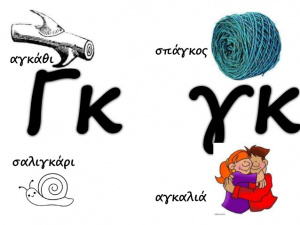Difference between revisions of "Language/Modern-greek-1453/Grammar/Words-written-with-γγ-or-γκ"
(modifié toute la leçon) |
m (Quick edit) |
||
| (13 intermediate revisions by 3 users not shown) | |||
| Line 1: | Line 1: | ||
[[File:-12-638.jpg|thumb]] | [[File:-12-638.jpg|thumb]] | ||
= | <div class="pg_page_title">When do we write a word with –γγ or –γκ?</div> | ||
Πότε γράφουμε μια λέξη με –γγ ή –γκ; | <blockquote>Πότε γράφουμε μια λέξη με –γγ ή –γκ;</blockquote> | ||
__TOC__ | |||
{| class="wikitable" | {| class="wikitable" | ||
|+ | |||
! | ! | ||
'''Ελληνικά''' | |||
! | ! | ||
'''English''' | |||
! | |- | ||
!'''Λέξεις γραμμένες με''' '''–γγ ή –γκ;''' | |||
! | ! | ||
==Words written with '''–γγ or –γκ'''== | |||
|- | |- | ||
|Στην ελληνική γλώσσα υπάρχουν λέξεις που εμπεριέχουν | |Στην ελληνική γλώσσα υπάρχουν λέξεις που εμπεριέχουν | ||
| Line 29: | Line 27: | ||
'''–γκ''', both give the sound: '''"gou"''' | '''–γκ''', both give the sound: '''"gou"''' | ||
|- | |- | ||
! | |||
'''-γγ''' έχουμε: | |||
! | |||
==When to use "-γγ"== | |||
|- | |- | ||
|'''1)''' Σε σύνθετη λέξη της οποίας το πρώτο συνθετικό | |'''1)''' Σε σύνθετη λέξη της οποίας το πρώτο συνθετικό | ||
| Line 99: | Line 87: | ||
mostly words that are adapted into the native noun system: | mostly words that are adapted into the native noun system: | ||
* Ά'''γγ'''λος : aglos : Englishman | * Ά'''γγ'''λος : aglos : Englishman | ||
|- | |- | ||
! | |||
'''-γκ''' έχουμε: | |||
! | |||
==When to use "-γκ"== | |||
|- | |- | ||
|'''1)''' Σε λέξεις ξένης προέλευσης που στα ελληνικά | |'''1)''' Σε λέξεις ξένης προέλευσης που στα ελληνικά | ||
| Line 190: | Line 146: | ||
* '''γκ'''ουβερνάντα : gouvernanda : governess | * '''γκ'''ουβερνάντα : gouvernanda : governess | ||
|} | |} | ||
{{Marianthi-Signature}} | |||
== | ==Other Lessons== | ||
* [[Language/Modern-greek-1453/Grammar/Irregular-Comparatives-and-Superlatives|Irregular Comparatives and Superlatives]] | |||
* [[Language/Modern-greek-1453/Grammar/Future-Tense|Future Tense]] | |||
* [[Language/Modern-greek-1453/Grammar/Greek-adverbs-through-examples|Greek adverbs through examples]] | |||
* [[Language/Modern-greek-1453/Grammar/Demonstrative-Pronouns|Demonstrative Pronouns]] | |||
* [[Language/Modern-greek-1453/Grammar/Pronouns|Pronouns]] | |||
* [[Language/Modern-greek-1453/Grammar/Prepositions|Prepositions]] | |||
* [[Language/Modern-greek-1453/Grammar/Methods-of-Argument|Methods of Argument]] | |||
* [[Language/Modern-greek-1453/Grammar/Verbs-ending-in-«–ίζω»|Verbs ending in «–ίζω»]] | |||
* [[Language/Modern-greek-1453/Grammar/Adjectives|Adjectives]] | |||
* [[Language/Modern-greek-1453/Grammar/Verbes-elliptiques,-impersonnels-et-irréguliers|Verbes elliptiques, impersonnels et irréguliers]] | |||
<span links></span> | |||
Latest revision as of 10:21, 27 March 2023
Πότε γράφουμε μια λέξη με –γγ ή –γκ;
|
Ελληνικά |
English |
|---|---|
| Λέξεις γραμμένες με –γγ ή –γκ; |
Words written with –γγ or –γκ[edit | edit source] |
| Στην ελληνική γλώσσα υπάρχουν λέξεις που εμπεριέχουν
τον ήχο :« γκου ». Αυτός ο ήχος άλλες φορές γράφεται με –γγ και κάποιες άλλες με –γκ. |
In Greek language there are words
which contain the sound: "gou". This sound is sometimes written with –γγ and other times with –γκ, both give the sound: "gou" |
|
-γγ έχουμε: |
When to use "-γγ"[edit | edit source] |
| 1) Σε σύνθετη λέξη της οποίας το πρώτο συνθετικό
τελειώνει σε -ν και το δεύτερο αρχίζει από γ π.χ.
2) Σε περιπτώσεις στις οποίες έχει παραδοθεί ιστορική ορθογράφηση με -γγ- π.χ.
3) Σε λέξεις αβέβαιης ετυμολογίας, όπου μπορεί να υπάρχει σύνθεση με :-ν και γ π.χ.
4) Σε λέξεις με καθιερωμένη γραφή, π.χ.
|
1. Compound words where the first element
ends in -ν and the second starts with γ-:
2. Words which had -γγ- in older derived froms (eg, under Ancient Greek phonological rules):
3. Words of unclear etymology where it is strongly believed that they were once compound words with ν+γ, or merely have been always attested with -γγ-:
4. Older loanwords transcribing a foreign mostly words that are adapted into the native noun system:
|
|
-γκ έχουμε: |
When to use "-γκ"[edit | edit source] |
| 1) Σε λέξεις ξένης προέλευσης που στα ελληνικά
δεν έχουν μακρά ιστορία ορθογράφησης με -γγ-, και άρα είναι φερμένες λέξεις : π.χ.
2) Σε περιπτώσεις σύνθεσης λέξης με -ν και κ- π.χ.
3) Σε περιπτώσεις που έχει παραδοθεί ιστορική ορθογράφηση με -γκ π.χ.
4) Στην αρχή όλων των λέξεων για την παραγωγή του ήχου «γκ» π.χ :
|
1) Words of foreign origin who do not have in Greek long history in -γγ-
2) Compound words with the first element ending in -ν, and the second starting with κ-:
3) Words with unclear etymology usually attested with -γκ-:
4) At the beginning of the words if we want to produce the sound "γκ »
|
Author[edit source]
- Ευγενική χορηγία που στοχεύει να βοηθήσει μαθητές ή μη, απανταχού της Γης, που επιδίδονται στην εκμάθηση της ελληνικής γλώσσας!
- Contribution bénévole visant à aider les personnes, partout dans le monde, qui sont engagées dans l'apprentissage de la langue grecque !
- Voluntary contribution aimed at helping people, all over the world, who are committed to learning the Greek language!
Other Lessons[edit | edit source]
- Irregular Comparatives and Superlatives
- Future Tense
- Greek adverbs through examples
- Demonstrative Pronouns
- Pronouns
- Prepositions
- Methods of Argument
- Verbs ending in «–ίζω»
- Adjectives
- Verbes elliptiques, impersonnels et irréguliers
